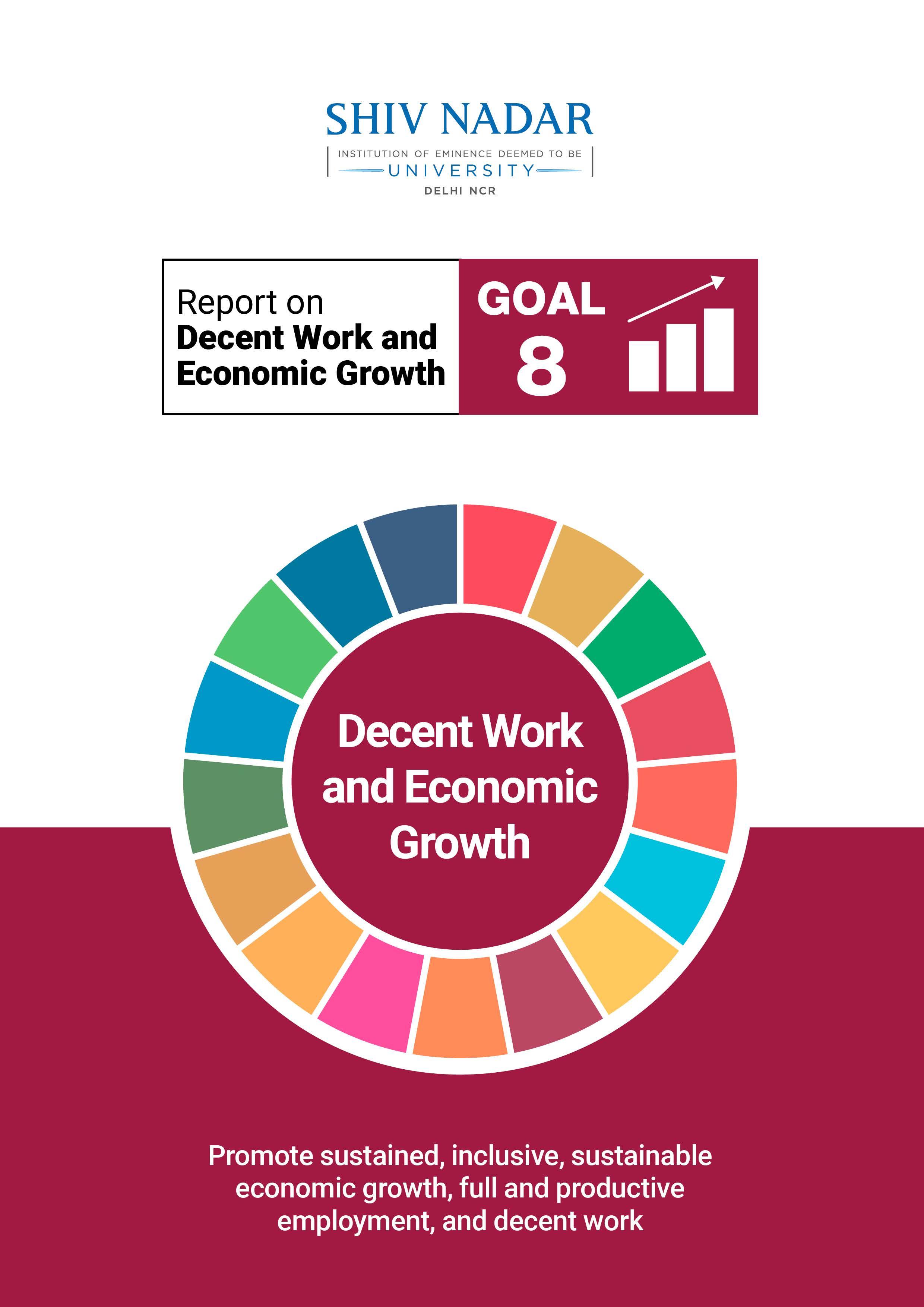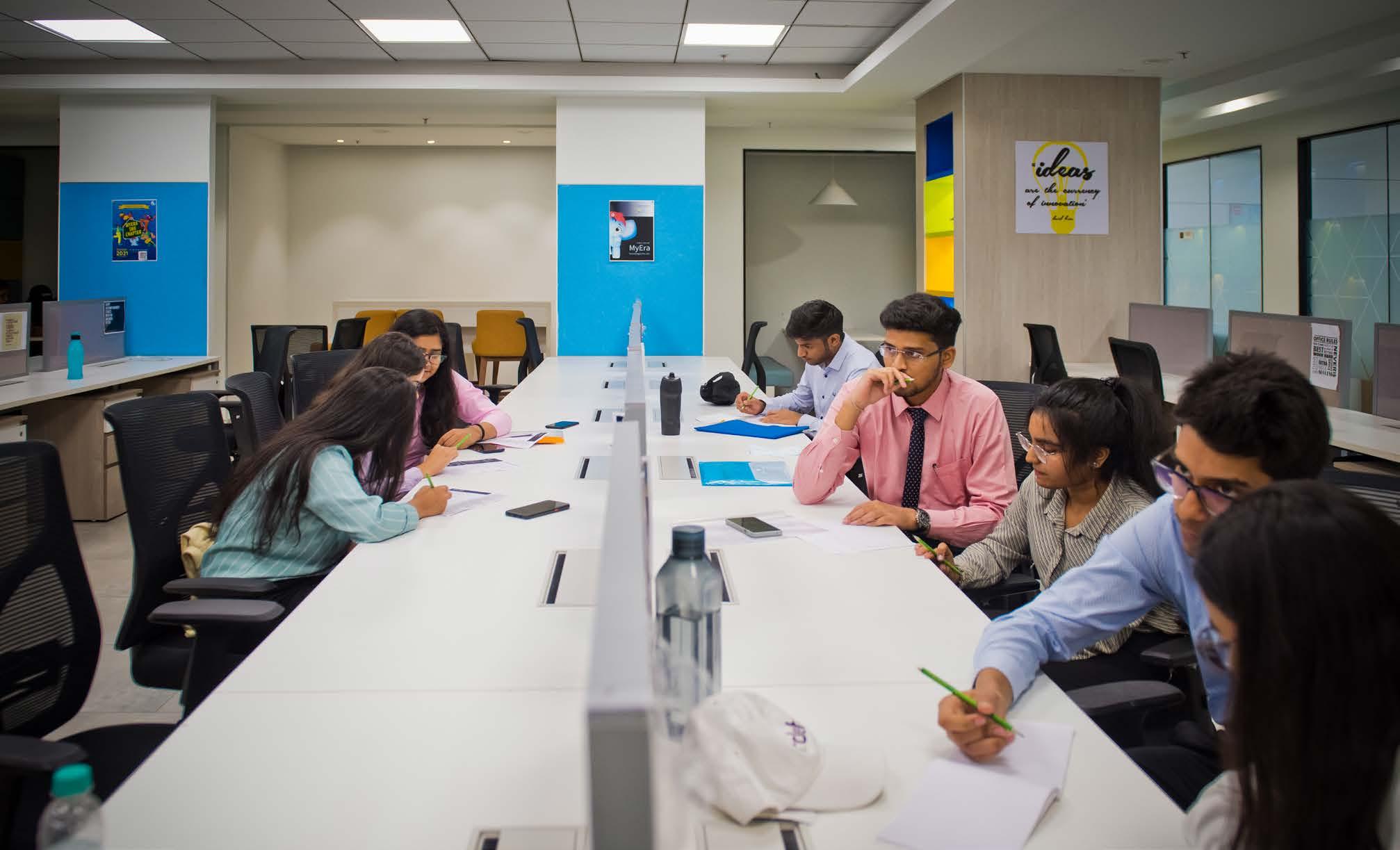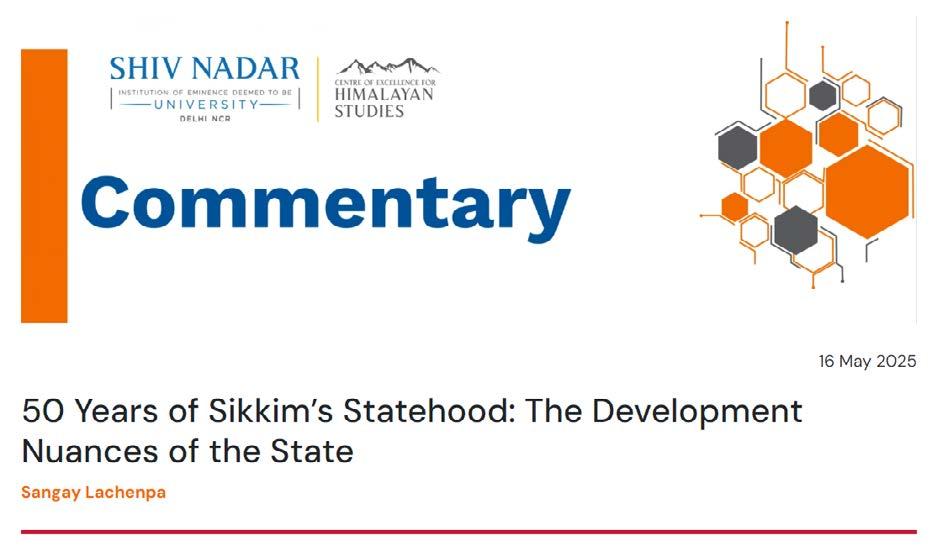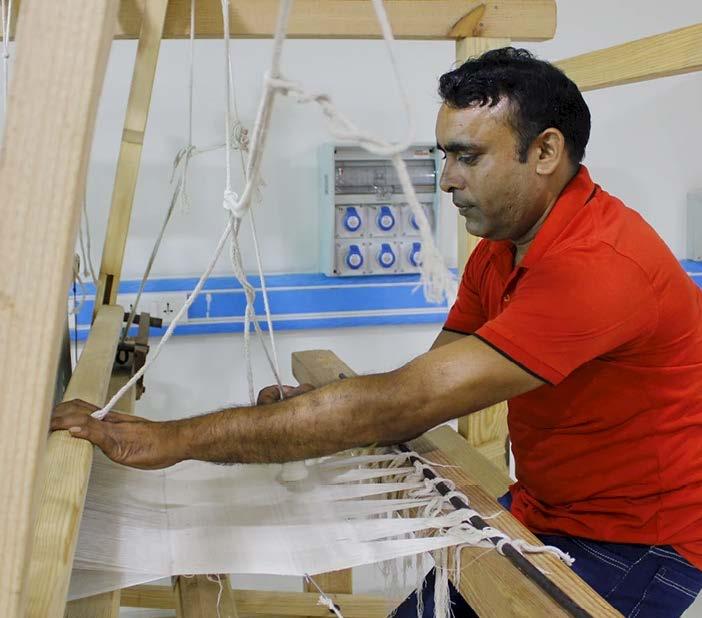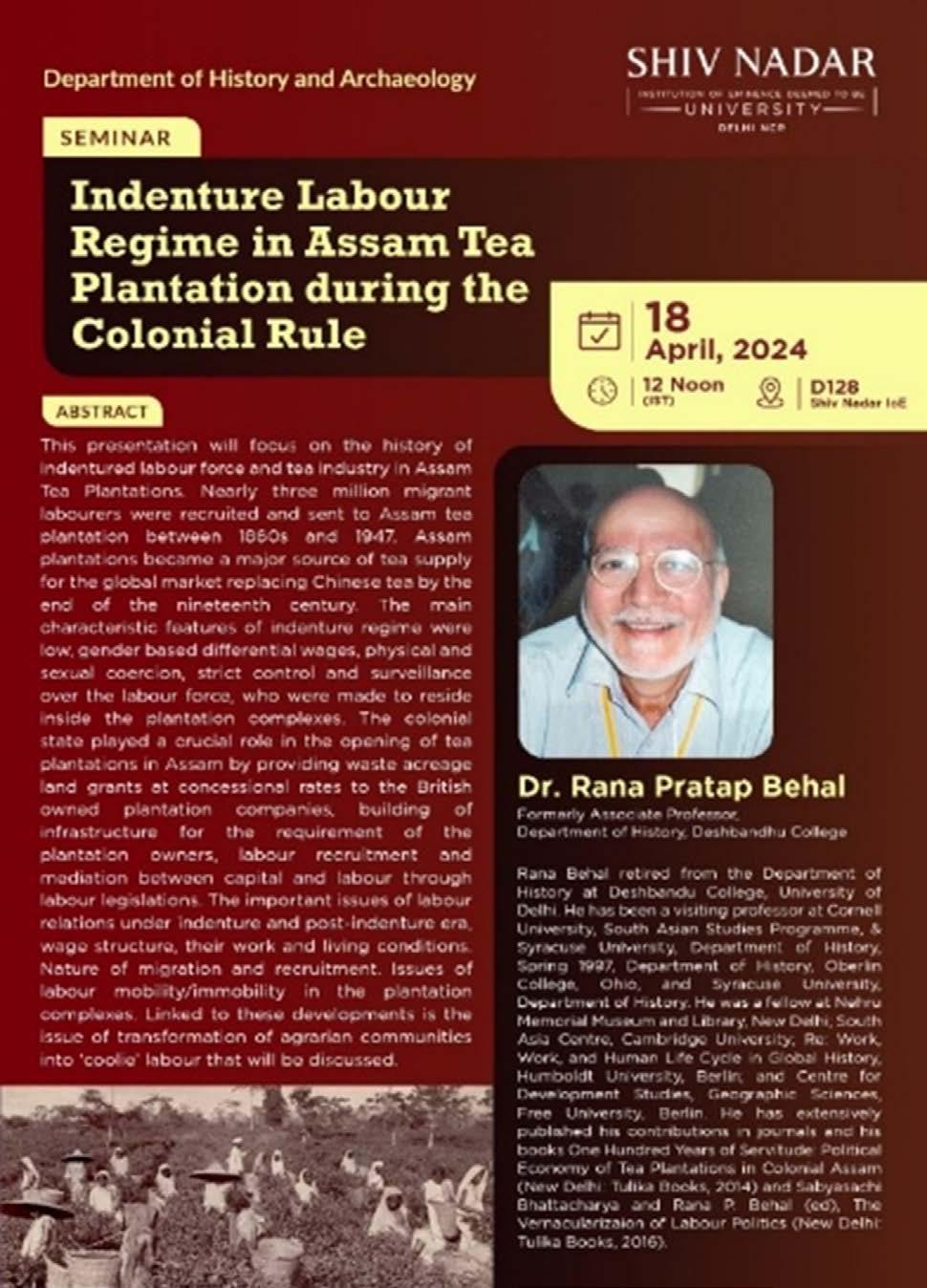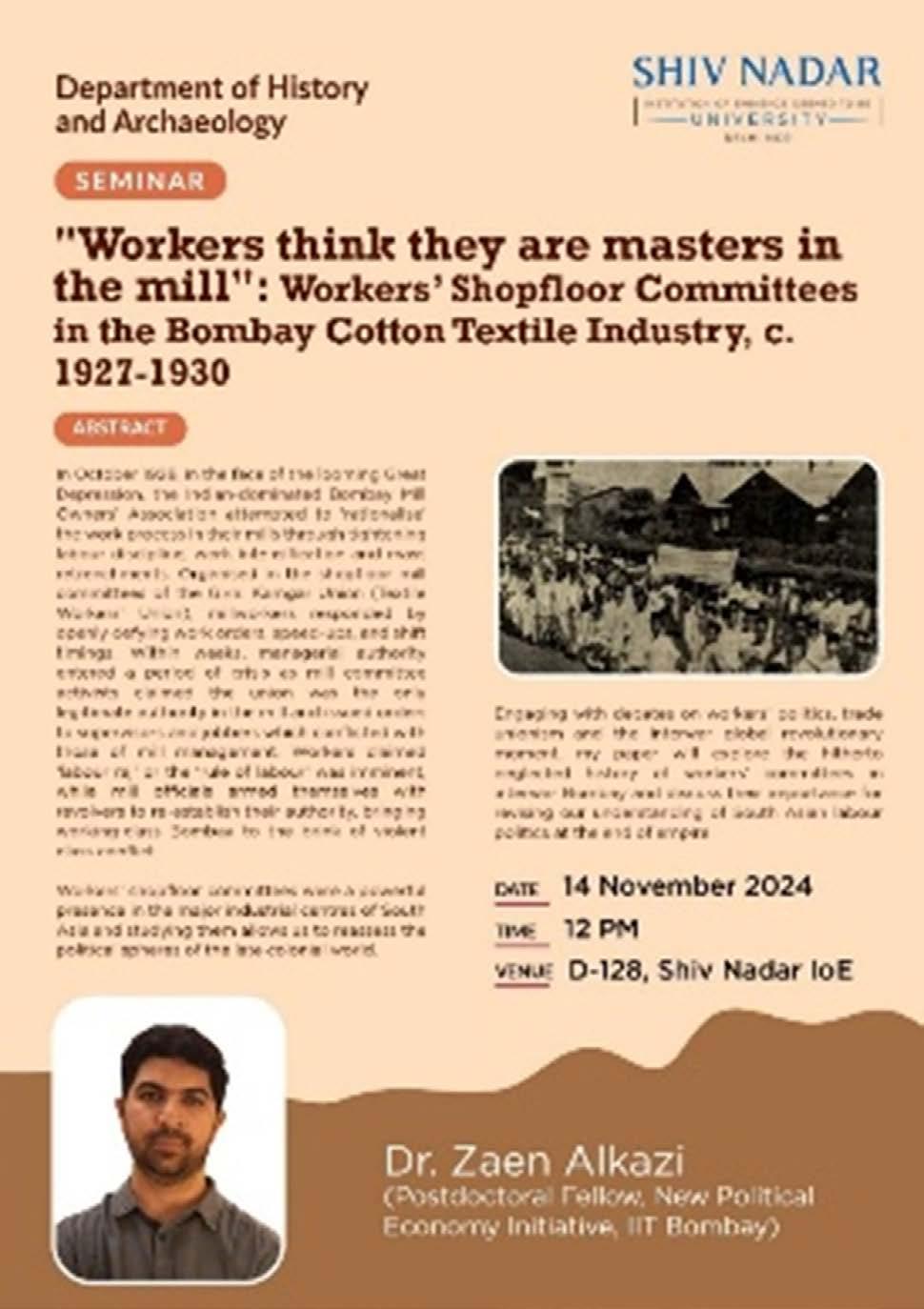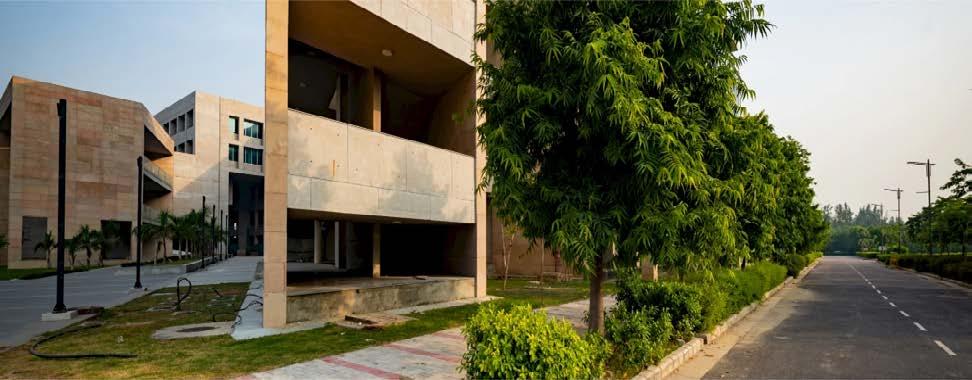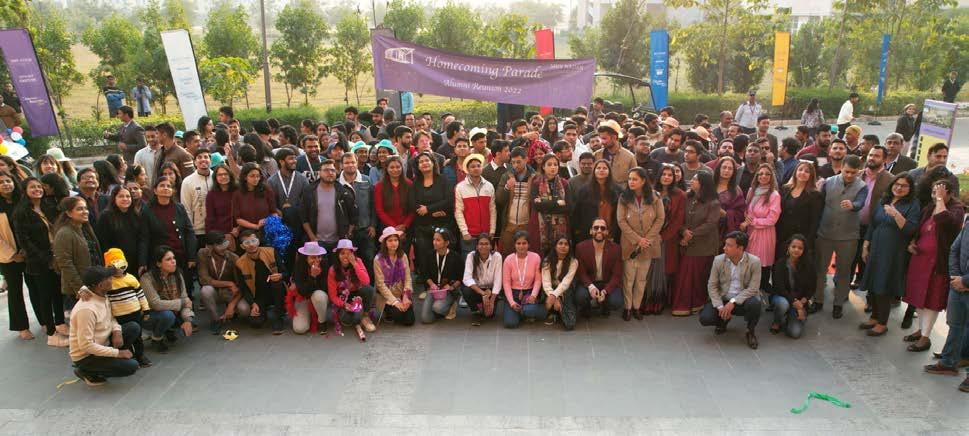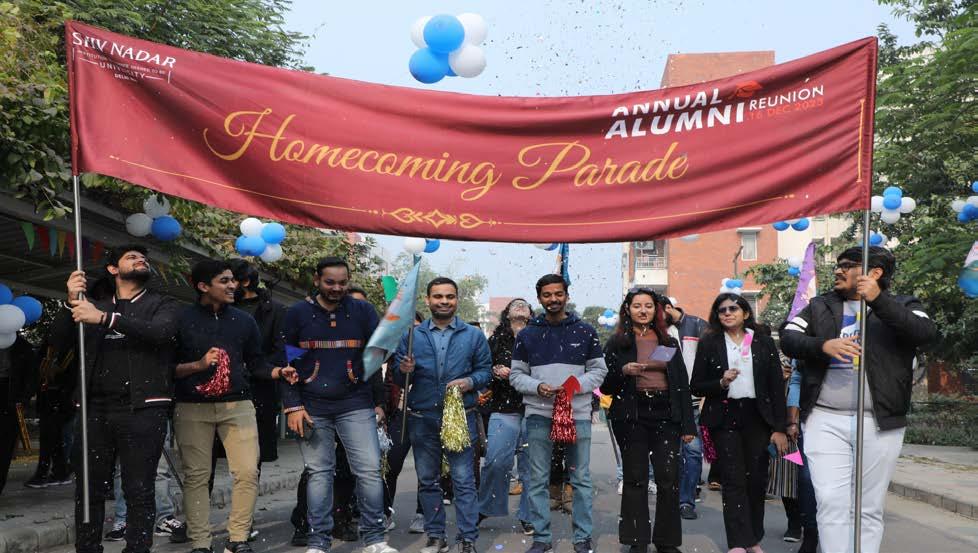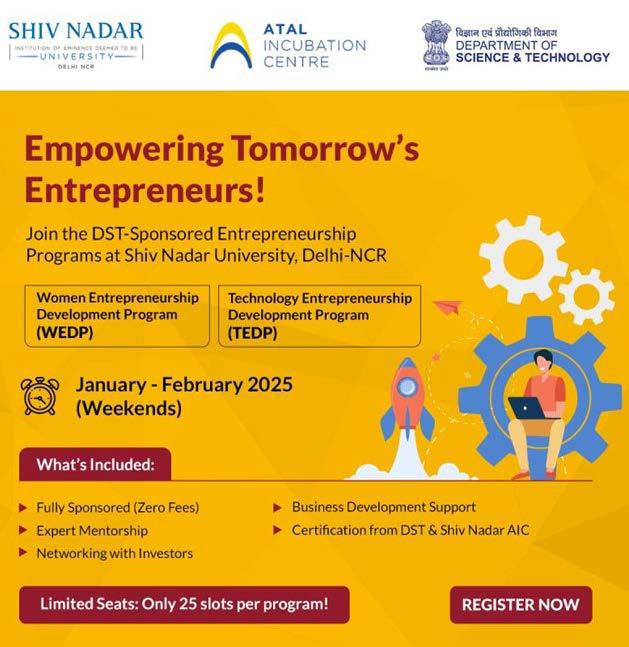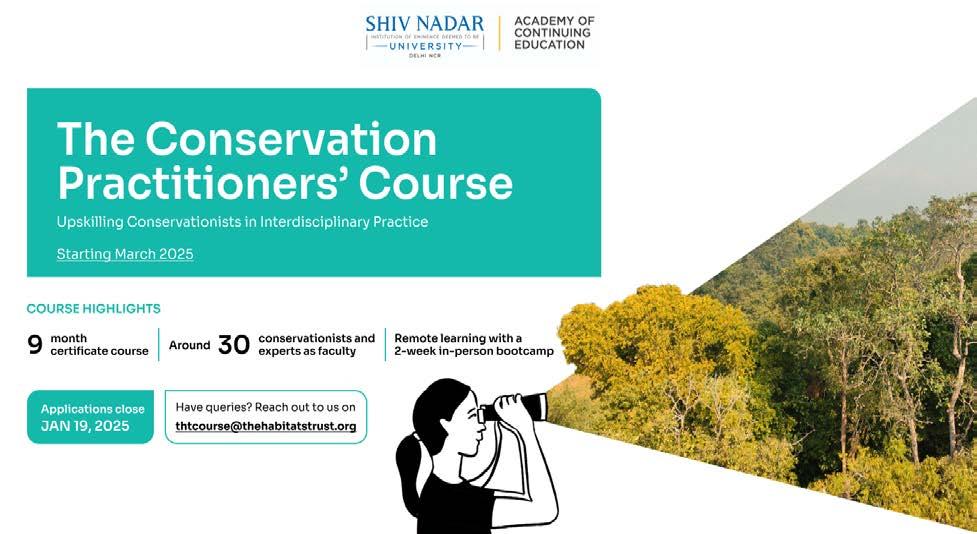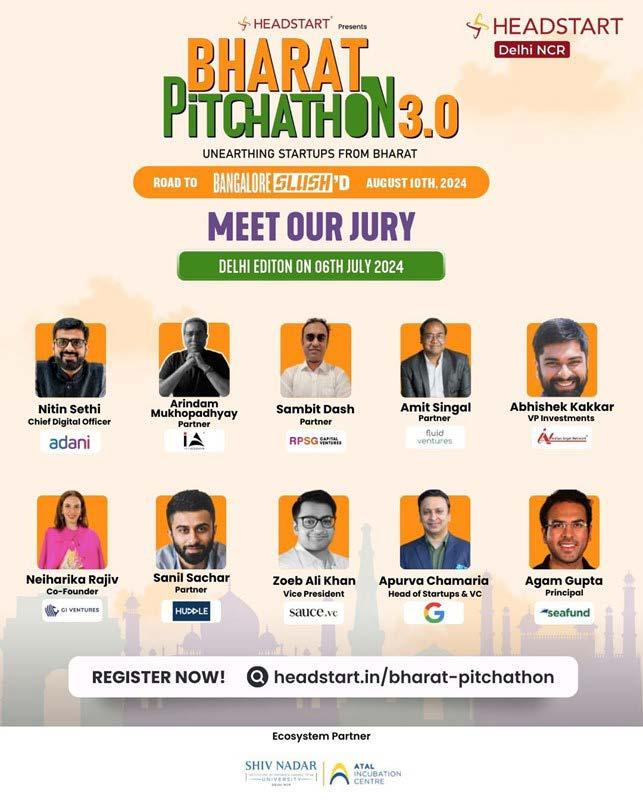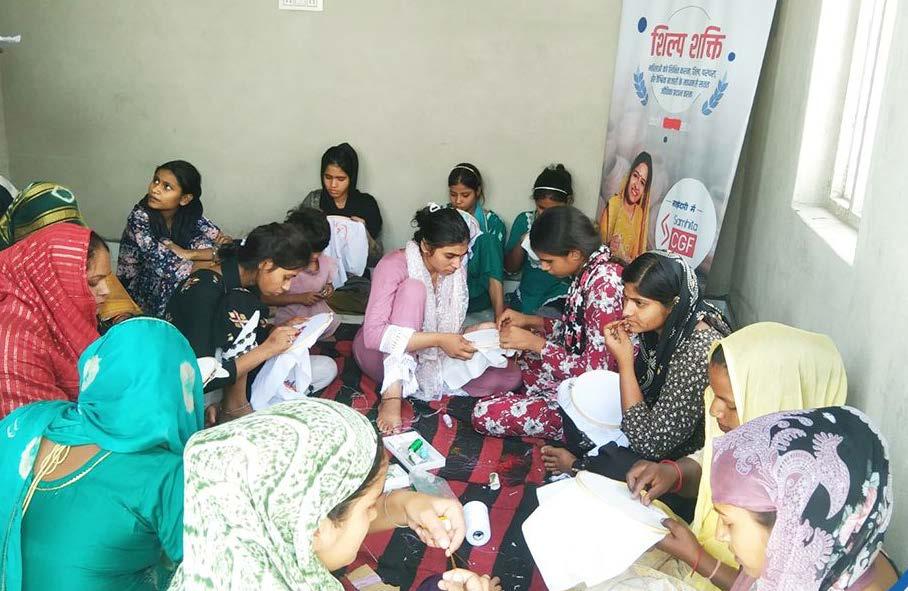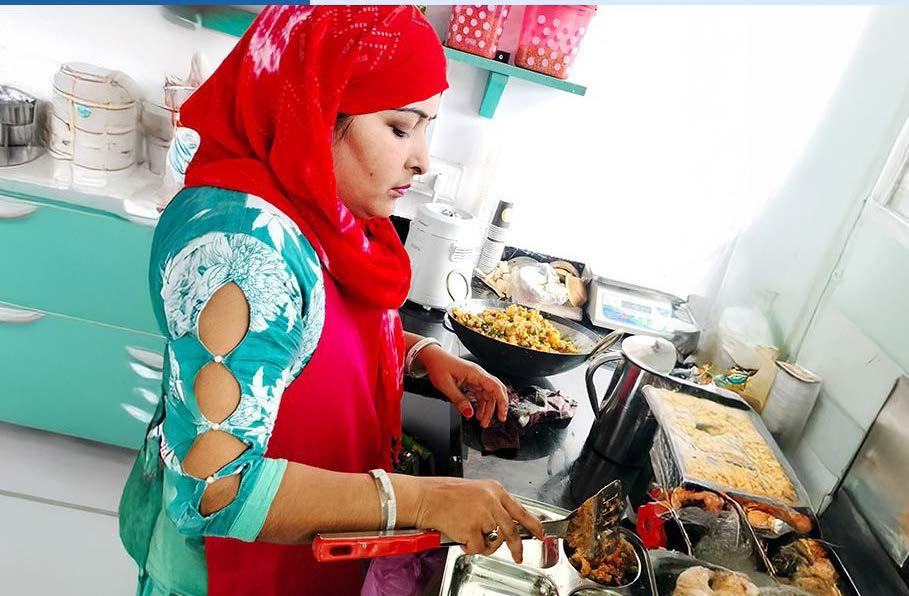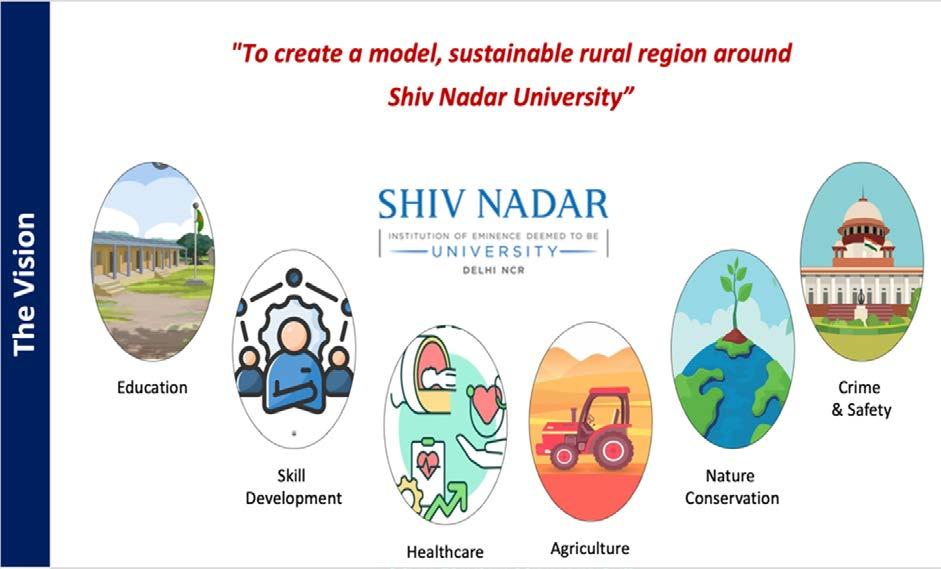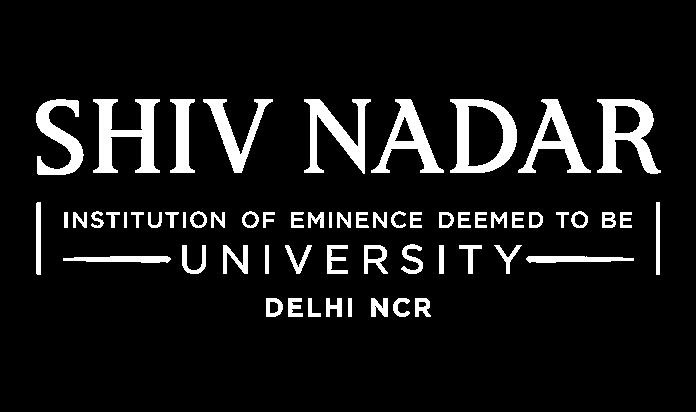Sustainable Development
Goal 8 emphasizes the role of higher education institutions not only in providing decent jobs but also in raising the future workforce towards contributing to decent work and economic growth. Thus, it underlines the need to achieve productive employment, decent work for all women and men, including young people and persons with disabilities, and equal pay for work of equal value.
At Shiv Nadar University, we contribute to SDG 8 through teaching, research, university practices, and partnerships. Here is a glimpse of our work.
TEACHING AND LEARNING
The School of Humanities and Social Sciences and the School of Management and Entrepreneurship offer undergraduate and graduate students courses, teaching several aspects and debates around decent work and economic growth. Some of these courses include, Economic Growth and Environmental Quality (ECO 292), Economic Growth and Development (SWC 601), Economic Development (ECO 415), Growth and Inequality (ECO 425), Economics of Discrimination (ECO 684), Interrogating Histories and Theories of Economic Development (INT 202), Development Economics (ECO 605), Education for Sustainable Development (SWE 313).
We also offer meaningful education around sustainability and related areas to all students across the University, such as Environmental Studies (CCC 704), Environmental Impact Assessment (CCC 406), Energy for Sustainable Future (CCC 614), Green Energy Technologies (CCC 613), and many more.
RESEARCH
Post Doctoral Fellowship Program at the Center of Excellence in Himalayan Studies
The Center of Excellence in Himalayan Studies at Shiv Nadar University has instituted a postdoctoral fellowship to support early-career scholars from Himalayan and border regions who may not otherwise have access to opportunities of this scale. The idea is to enable scholars to remain invested in, and actively work within, their home or field areas while contributing to relevant research and policy. The fellowship kicked off in January 2025 and has produced significant work.
Dr. Sangay Lachenpa is one of the post-doctoral scholars at the center who actively works and
publishes on issues around development and the environment. One example is:
50 Years of Sikkim’s Statehood: The Development Nuances of the State
The creation of such a ‘dependency economy’ entraps Sikkim in a ‘vicious circle of dependency’ where the state is dependent upon an external agency to continue its growth. The ‘dependency economy’ hinders long-term economic growth and is not sustainable. Often, local development dynamics become captive to the availability of central funds or the discretion of central authorities. If central funding through grants were to stop or weaken, or the central government would lower the share of central tax revenue disbursed, it would put fiscal stress on the state exchequer. Political bias and regional politics have always been a factor in the disbursement of the central funds (especially grants-in-aid). As the tax revenue and the non-tax revenue within the state form a marginal source of income, central government actions will have very consequential effects for inclusive growth and development in Sikkim.
Religious institutions and gendered time use: evidence from Ramadan festivities in India
The paper discusses how the religious mandate of the holy month of Ramadan affects the gendered distribution of time use within Muslim households in India. Using rich data on time use from a nationally representative time use survey and employing a difference-in-differences methodology, the paper argues that Ramadan moderates the gender disparities in intrahousehold time use for Muslim households. The
moderating influence is stronger in districts with a higher Muslim proportion. The reduction in gender differences is due to declines in gender-specific time use in employment, learning activities, domestic work, and self-care. Reduction in domestic work time for women, especially food preparation time, is more pronounced in districts with a high Muslim proportion, suggesting the ‘communalisation of domestic work’ due to Ramadan.
Dasgupta, Aparajita, and Ashokankur Datta. “Religious institutions and gendered time use: evidence from Ramadan festivities in India.” Journal of Population Economics 37, no. 3 (2024): 57.
Redesign of the traditional handloom
Dr. Prakash Kumar, Associate Professor, Department of Design, received a research grant from the Department of Scientific and Industrial Research (DSIR), Government of India, for a project to redesign the traditional handloom. The project aims to address occupational problems associated with conventional handlooms, which make weaving a cumbersome and physically demanding task involving both legs and hands. Redesigning the traditional handloom would increase their efficiency and output, hence the income for the weaver. Another important aspect is that of marginalized weaving communities who cannot buy a new system by discarding the present setup. The project is developing a set of low-cost accessories that can be fitted to existing traditional arrangements so that, at a minimal cost, weavers can increase their efficiency and income at the same time.
Conversation on Campus UNIVERSITY OPERATIONS
Careers at Shiv Nadar
At Shiv Nadar University, we provide a diverse and inclusive work environment with equal professional development opportunities and academic freedom. The university offers competitive salaries and benefits, academic leaves, and encourages work-life balance. As an employer, it offers benefits packages that include comprehensive medical coverage and other programs to promote professional growth and personal well-being. From a vast array of development programs to workshops and career programs, people from diverse backgrounds are encouraged to join the community and contribute to a discrimination and harassment-free workplace. The university hires qualified people and offers them a stimulating workplace to learn.
Disability Support Cell
Shiv Nadar Institution of Eminence has constituted a Disability Support Cell (ref. bod/2019-20/632, for compliance with the Honourable Supreme Court Order No.292 of 2006) for the staff and students with disabilities in the University. The objectives of the cell are to make the campus friendly for all with disabilities, provide easy access to resources, address problems or special needs, and facilitate the worklife journey while maintaining the confidentiality of disability-related information. Everyone on campus can access the cell via the office and contact disability.support@snu.edu.in.
Campus Jobs
The University provides students with opportunities to enrich their holistic learning experience with real-life work. The work may or may not be directly related to the subjects they are studying; undergraduate students gain experiential and applied to learn through these opportunities and inculcate ethics, leadership, and service attributes.
Skill Development Program
Shiv Nadar is committed to providing educational opportunities to everyone, regardless of gender, race, religion, or ethnicity. The University imparts a skill development program that provides critical life skills to the children of the University’s third-party members residing in nearby areas and enhances their prospects for a brighter tomorrow. University faculty and students volunteer to impart classes to these children to improve their computer and language skills. Besides, the University ensures that there is no child labor across all its contracts and that all labor compliances per government norms are adhered to strictly.
Career Development Center (CDC) and Placement Cell
The University has a dedicated Career Development and Placement Cell to prepare students for employment. The university-industry partnerships provide excellent opportunities to expose students to industry culture and better prepare them to start working at these companies after graduation. Students gain training in skilled industrial applications and the ability to navigate the treacherous industrial setup. The mutually beneficial partnerships produce groundbreaking research and innovation that solves complex problems, drives economic growth, and creates a more skilled workforce. These partnerships intend to foster a sense of individuality and responsibility in our future employees. The university extensively collaborates with reputed industries for live projects, guest lectures, leadership talks, workshops, collaborative research, internships, and placement offers for our students, along with partnering with leading industry players in domains such as consulting, mechanics, science and technology, and telecommunication.
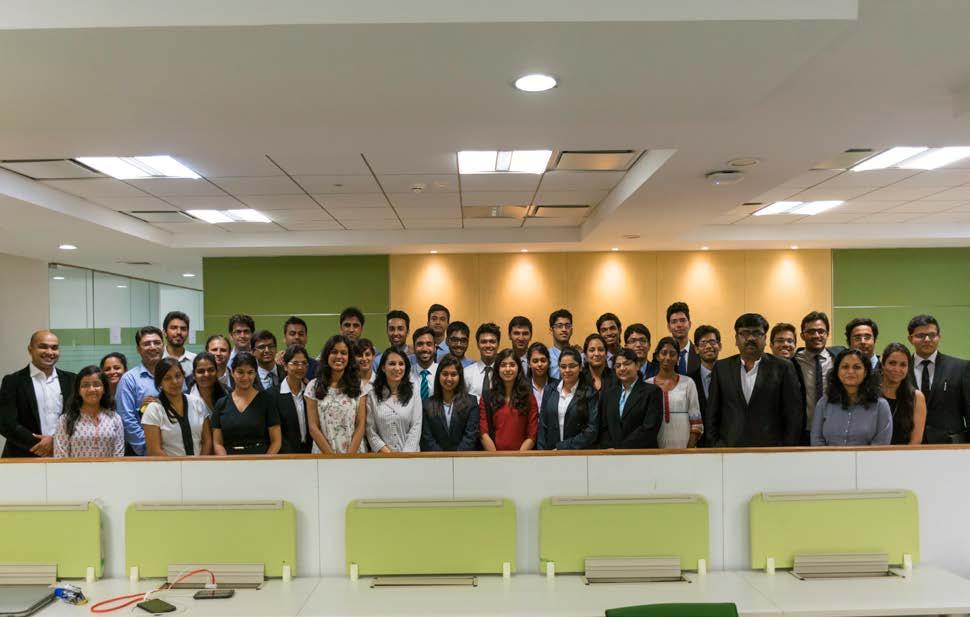
Alumni Office
Shiv Nadar University has a strong network of alums across the world. Established in January 2015, the alumni relations office takes care of alumni engagement and maintains a communication channel to make them a part of the institution’s future, not just its past. This strong alum relationship has contributed to sustainable employment and growth.
PARTNERSHIPS
Opportunity for young entrepreneurs in partnership with the Department of Science and Technology (DST), Atal Incubation Mission (AIC), and Shiv Nadra University
Shiv Nadar University, Delhi-NCR, in partnership with the Department of Science and Technology, launched the Women Entrepreneurship Development Program (WEDP) and the Technology Entrepreneurship Development Program (TEDP). Designed to empower individuals to launch their ventures through training, mentorship, and networking support, the programs offered an opportunity to get incubated at the Shiv Nadar University - Atal Incubation Centre.
Both programs are offered as custom-designed technical entrepreneurship training for graduates in science and technology domains, focusing on innovation and impact.
Partnership with The Habitat Trust (THT)
Shiv Nadar University and The Habitat Trust (THT) have signed a Memorandum of Understanding to contribute to the capacity building of students. Towards this, the university students undertake internships and volunteer work at THT, and the employees at THT have an opportunity to pursue a Ph.D. at the University. Under this partnership, we regularly organize short webinars and sessions on various themes.
The collaboration also involves developing a course on conservation practitioners to be hosted at Shiv Nadar University. The THT Practitioners’ course, in partnership with the Academy of Continuing Education, Shiv Nadar University, started in September 2024. The course is for conservation practitioners and will provide a strong understanding of various disciplines, how to integrate them, and their applications.
Besides, there are ongoing research projects with the School of Humanities and Social Sciences and the School of Natural Sciences.
Atal Incubation Center, Shiv Nadar University, partners with PW School of Startups
Shiv Nadar University - Atal Incubation Centre has collaborated with the PW School of Startups to empower innovation and entrepreneurship. Three remarkable startups from the Startup Cradle 3.0 cohort have been selected for the AARAMBH Program, an initiative by the PW Foundation.
This partnership is designed to nurture innovation by offering the selected startups access to resources, expert mentorship, and growth opportunities, enabling them to scale their ideas and make a significant impact.
Atal Incubation Center, Shiv Nadar University, partners with Headstart Network Foundation
Shiv Nadar AIC in association with Headstart Network Foundation organized Bharat Pitchathon 3.0 in July 2024 in Delhi, where innovative startups from across the Delhi region pitched their
groundbreaking ideas. The forum was created to provide mentorship, feedback, access to top investors, networking opportunities with experts and entrepreneurs, and growth and partnership opportunities.
Community Initiative through the Community Connect Program
Through its Community Connect Program, Shiv Nadar University strongly focuses on community engagement in Dadri. These initiatives aim to uplift the local community through various programs, including skill development, healthcare awareness, and promoting sustainable practices. Here is a glimpse of some of our projects in this program.
Shilp Shakti
This initiative empowers women in the neighboring villages by providing them with skills in local businesses such as jewelry making, crochet, and business management.
Community Kitchens
As part of Shiv Nadar University’s Community Connect Program, in collaboration with ACCESS Development Services, women in neighboring villages are trained to operate SHG-led community kitchens, equipping them with essential entrepreneurial skills. The sessions covered savings, credit linkages, budgeting, digital payments, and
online food delivery platforms, enabling participants to develop practical kitchen management budget plans. This initiative fosters self-reliance and sustainable growth by emphasizing digital and financial literacy. Through community-driven enterprises, these women are shaping a future of economic independence and grassroots impact.
Education and Skill Development
The university also runs programs to impart key life skills to children of its third-party staff and enhance their prospects for the future.
This multi-faceted program includes well-considered, need-based interventions with multi-stakeholder engagement, implemented in phases, supported by thorough evidence, and subjected to rigorous monitoring and evaluation. These projects focus on education, health care, skill development for employability, social safety, reduced inequalities, nature conservation, and agriculture.
Shiv Nadar Institution of Eminence is fully committed to the UN Sustainable Development Goals (SDGs). We have embraced a four-pronged strategy for SDGs through teaching, research, our core institutional practices, and partnerships.
Deepa Hazrati Senior Manager, Office of the Vice-Chancellor deepa.hazrati@snu.edu.in
Shiv Nadar Institution of Eminence Gautam Buddha Nagar, Uttar Pradesh, India
